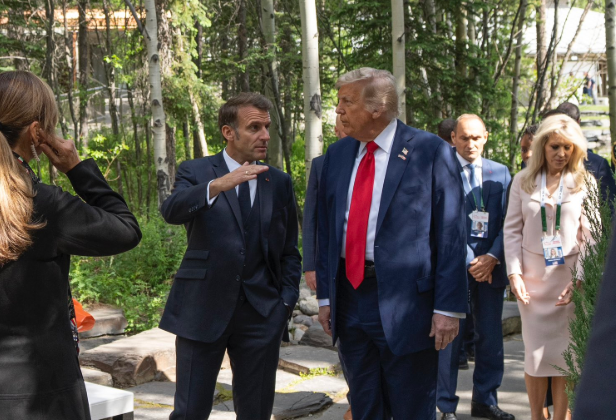
In recent developments, the diplomatic ties between the United States and France appear to be deteriorating rapidly. The tension between the two nations is largely being driven by the personal rivalry and public confrontations between U.S. President Donald Trump and French President Emmanuel Macron. Although both leaders maintain a formal tone in public appearances, the reality behind the scenes tells a different story—one marked by mutual disdain and repeated attempts to undermine each other.
Donald Trump, known for his direct and often confrontational style, has not missed any opportunity to attack President Macron. Similarly, Macron, on various occasions, has responded in kind, ensuring that he never misses a chance to challenge or criticize Trump in return. This pattern of tit-for-tat behavior has kept their rivalry in the spotlight and further deepened the strain in bilateral relations.
The recent G7 summit became yet another battleground in this ongoing feud. President Trump abruptly left the summit midway and returned to the U.S., a move that sparked reactions worldwide. In an apparent diplomatic jab, Macron commented that Trump left the meeting early to “work towards a ceasefire,” indirectly portraying the U.S. President's move as a strategic peace initiative. However, Trump quickly hit back, labeling Macron a “publicity seeker” and claimed that the French President had no idea why he actually left the summit. According to Trump, Macron was merely using the situation for free publicity and media attention.
This war of words didn’t stop there. President Macron, seizing the next available opportunity, openly criticized a major U.S. military decision. He condemned the recent American airstrikes on Iran’s nuclear facilities, calling them illegal and lacking any legitimate basis under international law. Macron made it clear that while France does not support Iran developing nuclear weapons, it strongly opposes unilateral military actions. Instead, France prefers dialogue and diplomacy over aggression.
Macron’s statement was a direct rebuttal to Trump's approach and served as a public denunciation of American foreign policy under the Trump administration. By labeling the strikes as unlawful and inappropriate, Macron sent a strong message that France does not support America’s aggressive stance on Iran.
These events clearly reflect the intensifying discord between Washington and Paris. The clash of ideologies—military action versus diplomatic resolution—continues to widen the gap between the two leaders and, by extension, their nations. While their public appearances may suggest civility, the undercurrent of political and personal rivalry is evident and persistent.
With both Trump and Macron unwilling to back down, the world is witnessing a significant shift in what was once considered a stable alliance between the U.S. and France. How this rivalry shapes future international
Disclaimer:
This article is based on recent media reports and public statements. It reflects the current state of diplomatic interactions and political commentary between the United States and France. Interpretations and opinions presented are for informational purposes only.




